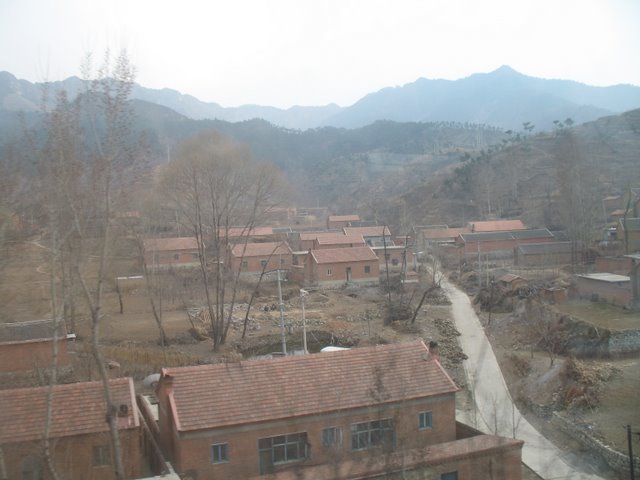The CW has it that Chinese peasants, still the majority of the population, have been left behind by the heady urban boom, on display here in central Changchun, an ordinary industrial city in Manchuria. Maybe so, but here’s a datum to the contrary: an unexciting snap, taken from the Chengde train, of a village in Hebei province, about 250 km NE of Beijing.
Most of the houses have obviously been newly rebuilt, with brick walls and higher roofs. (Feng Shui and the cost of land may explain why houses stay on the same plots.) This is entirely typical for the area. It’s dangerous to generalise about a huge country from anecdotal evidence; still, it is evidence that at least one substantial group of Chinese peasants are doing absolutely better than before, whether or not they are falling relatively behind the city-dwellers.
Villages in Manchuria didn’t seem to have so much new construction, though the houses tend to be bigger anyway. A speculative explanation lies in trade: Manchuria grows locally-consumed wheat, Hebei a lot of apples, which are showing up in our local supermarket in Spain. Export dependency has its downside; it’s not just the factory workers who will suffer when the exchange rate rises, as it must, to more realistic levels.
The broad-based development in China I saw contrasts even from the train window with Russia’s growth: visibly, the oligarchies that control the unequally distributed natural resources extract massive rents for lucky cities but leave others behind. On the China-Russia border, where Siberia’s timber is sucked south to feed a million Chinese building sites, compare the centre of the booming Chinese town of Manzhouli with its its derelict Russian counterpart of Zabaikalsk. (The shot is only a little unfair; there’s one street by the station of the usual seedy Soviet apartment blocks.) In western Siberia, spruce and beggar-free Omsk contrasts with brooding Tobolsk whose moment of glory was back in the seventeenth century. Kazan, capital of lucky Tatarstan, has money to blow on an ugly new mosque, and even a plush five-station metro - on which more in my next post.
